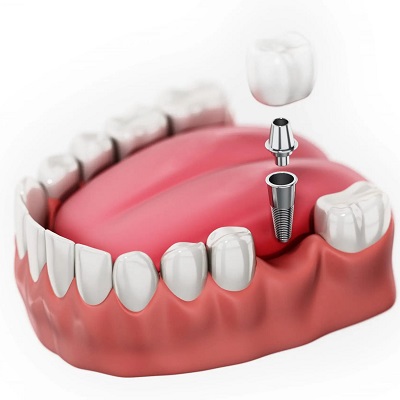
One common and sensible approach to restoring missing teeth is dental implant placement. Moreover, many patients, meanwhile, are unsure if the procedure causes discomfort. Therefore, they ask Does a Tooth Implant Need Anesthesia? Moreover, we will discuss it in this blog.
What is a Tooth Implant?
A tooth implant is a lifetime dental solution wherein a missing tooth is replaced with a synthetic one. Three components comprise the implant: an anchor, a crown resembling a genuine tooth, and a titanium tube serving as the root. Many patients who want a long-term solution for tooth loss decide on implants.
Does Tooth Implant Need Anesthesia?
You may have a question: “Does a Tooth Implant Need Anesthesia?”. Therefore, ensuring the patient does not experience discomfort throughout the operation depends much on anesthesia. Moreover, the surgeon must drill into the jawbone to insert the implant, so improper management of the pain might cause discomfort. Either freezing the region or sedating the patient will help you to complete the operation without causing discomfort. There are many forms of anesthesia available for tooth implants:
Local Anesthesia:
Local anesthesia is used in dental procedures, including tooth replacements. This kind of anesthesia numbs only the place the implant will pass through. The patient feels no pain and remains awake. Usually, it is the ideal choice for simple devices when the patient finds comfort with the approach.
Sedation Anesthesia:
Medication in a medium ground is sedation drugs. It keeps the individual alert and dulls their emotions, bringing tranquility. Those who are afraid about the therapy but do not want complete general anesthesia might find this to be a suitable option. The local anesthetic is still numbing the region; the patient is still conscious but tranquil.
General Anesthesia:
Sometimes, general anesthesia is used for oral surgery, including dental implant placement. Usually, this is only done for those who have many implants or are rather anxious about seeing the dentist. The patient undergoing general anesthesia will not feel or recall anything during the procedure; they are completely sleeping.
The Implant Procedure:
Usually involving many procedures, a tooth implant is performed under anesthesia at each one where discomfort might be an issue.
Evaluation and Planning:
Before the procedure begins, your dentist or oral surgeon will review X-rays and create a comprehensive treatment plan. You are not using medicine at this stage.
Implant Placement:
Dentists will numb the region either locally or sedately while placing the implant. The dentist will drill a little hole in the jawbone, cut the gum, then put the titanium post in. They will sew the gum back together. The sedation will allow you not to feel any pain; you may have some pressure or a little discomfort instead.
Healing Time:
It takes time for the gadget to merge with the bone, which we call osseointegration. Unless dentists suggest additional modifications, sedation is unnecessary at this stage.
Abutment and Crown Placement:
Abutments are first attached to the implant; when the implant has bonded with the bone, the crown is placed above it. This procedure section may also be done under local anesthesia, particularly if the gum has to be reopened.
Recovery Following Surgery:
After the operation, you may feel discomfort; most over-the-counter medicines can help. Your doctor will advise how to care for the implant area and minimize pain. Though everyone recovers differently, most individuals may resume their regular activities in one or two days.
Benefits of Anesthesia:
- Pain-Free: Anesthesia removes any potential discomfort experienced during the treatment.
- Reduced Anxiety: Sedation helps patients who fear dental procedures to feel less nervous.
- Faster Treatment: Should the dentist have appropriate anesthesia, he or she may operate fast and efficiently, expediting the completion of the treatment.
Individual Candidate for Dental Implants:
For most healthy persons losing teeth, dental implants are an excellent choice. The procedure works best on patients with strong jawlines and excellent dental health. Before proceeding, however, those with health issues like diabetes that are not under control or those who smoke heavily may require extra assistance.
Final Thoughts:
Indeed, dental implants need anesthetic to ensure the patient has no discomfort and the procedure runs without hiccups. The therapy and the patient’s degree of comfort determine the many forms of sedation used. Thanks to present methods like local anesthetic, sleep, or general anesthesia, getting a tooth implant is now a safe, simple, and long-lasting treatment.
Dynamic Clinic Pk offers all dental treatments. Hence, book your appointment to get the treatment of all your cosmetic and medical issues.




